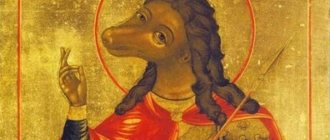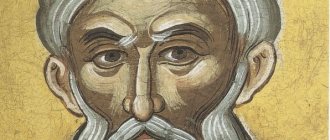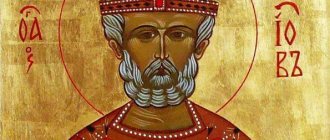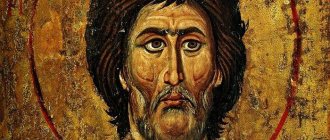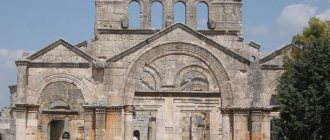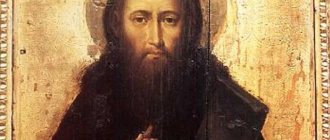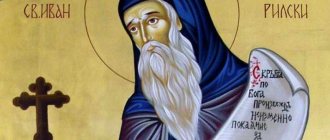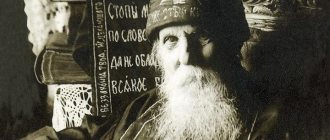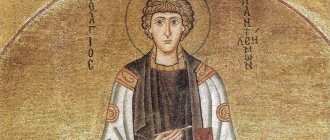Joshua is one of the central figures in the Old Testament and the Book of Joshua. According to the books of Exodus, Numbers and Joshua, he was Moses' assistant and became the leader of the Israelite tribes after Moses' death. His name was Hoshea son of Nun, from the tribe of Ephraim. Moses gave him the name Jesus. According to the Bible, Joshua was born in Egypt before the Exodus.
According to the Old Testament, Joshua was one of the twelve spies of Israel sent by Moses to spy out the land of Canaan. The book of Numbers says that after the death of Moses, Joshua, the son of Nun, led the Israelite tribes to Canaan. According to biblical chronology, Jesus lived at the end of the Bronze Age and died at the age of 110.
Brief biography of the righteous Joshua
Joshua is revered as a righteous man in Judaism, Christianity and Islam. By this name he is known in the Orthodox Church. To distinguish him from Jesus Christ, a paternal name was added to his name: Nav - father, the suffix - “in” means son of Joshua. In the Catholic and Protestant traditions, the name Jesus is rendered as Iosue, in Islam - Yusha (Yusha).
Origin
Joshua was the son of Ephraim (Ephraim) and at birth bore the name Hosea (in ancient Hebrew transcription - Hoshea). Joshua's grandfather was Joseph, one of the 12 sons of Jacob, whom his envious brothers sold into slavery to the Egyptians.
Joseph managed to rise to the rank of vizier of the pharaoh. At his request, the ruler gave a land plot to Joseph's brothers and father during the great famine. Ephraim and Hosea were born in Egypt.
After Joseph's death, the situation of the Jews gradually changed for the worse: they found themselves at the lowest rung of the social ladder and were reduced to the level of slaves. God Yahweh appeared to Moses and commanded him to free the people of Israel from Egyptian captivity.
Conquests
Hosea was the right hand of the prophet Moses, who renamed him Yehoshua (Jesus), appointed him as a military leader and his successor after death. The choice of the prophet was not accidental. Before leading the people to Canaan, he sent 12 spies there. Hosea alone, upon returning, expressed to the prophet the firm opinion that with God's help these lands could be conquered. For this, he, the only one from the generation of Jews who left Egypt, was allowed by Yahweh to set foot on the Promised Land.
Before his death, Moses received instructions from the Lord to name Jesus as his successor, because he had the “spirit of wisdom” and would be able to lead the people in the conquest and division of the land.
The road to the Promised Land (Canaan), promised by God to the chosen people, lasted 40 years and ran through the desert. It is known from biblical sources that when leaving Egypt, the refugees were blocked by warlike Arab nomads who wanted to take possession of the property and livestock of the Jews. Moses said to Joshua: “Go and fight the Amalkites...” Having led the army, Navin defeated the armed nomads, and the Israelites continued their exodus from Egypt.
During the entire journey, Joshua was next to Moses: he was present during communication with God at Sinai, and guarded the Ark of the Covenants. For his disbelief in the power of Yahweh, Moses was deprived by the Lord of the right to set foot on the land of Canaan. He died on the border with the Holy Land, seeing his cherished goal from a mountain top. Before his death, Moses publicly laid his hands on Jesus, thereby transferring to him his authority over the Jewish people.
After the death of the prophet, God appeared to Jesus in a dream and commanded him to cross the Jordan River and populate the Promised Land: “Every place where your feet set foot, I give to you... Be strong and courageous, for you will give possession to this people of the land that I swore give them to their fathers." (The land promised to the Jewish people is the territory of Palestine, the Euphrates and Tigris Rivers, the Mediterranean coast).
Yahweh predicted Joshua's victory over all who stood in the way of carrying out his will. God promised to always be there, as he was with Moses, if he kept the law, exactly fulfilling the commandments written on the tablets: “... carefully keep and fulfill the law bequeathed by Moses... do not deviate from it either to the right or to the left... then you you will be successful... do not be afraid, for the Lord will always be with you.”
The next day, Jesus ordered preparations to be made for crossing to the west bank of the Jordan River, on which the city of Jericho was located. The river was overflowing at this time of year, and there was no way to cross it. The townspeople from the walls of Jericho calmly watched the bustle on the opposite bank. Joshua came to the Jews, whose lands were on the eastern bank of the Jordan, and called on them to help recapture the Promised Land from the Gentiles, as Yahweh had commanded. The tribal leaders agreed to provide military assistance with 40 thousand warriors.
At the direction of Jesus, the priests with the Ark of the Covenant walked at the head of the column, the rest kept their distance. When the priests approached the river, a miracle happened: the flow of water stopped, rising like a wall several kilometers from the crossing, the rest of the water flowed into the Salt Lake. The priests reached the middle of the riverbed and stopped. When all the people and warriors crossed to the other side, they left the river bed and the water returned to its banks. The miracle raised the authority of Joshua among the Jews, who had previously treated him as the “shadow” of Moses. From a humble servant he turned into a ruler.
The news that the Jewish army had crossed the Jordan horrified the tribes inhabiting Canaan. The inhabitants of Jericho locked the gates and decided to fight back, hoping for high and strong city walls. At night, the Archangel Michael appeared to Joshua and showed him how to take the city. The next day, soldiers led by priests carrying the Ark of the Covenant and calling out prayers walked around the fortress. This went on for 6 days. On the 7th day they walked around 7 times. At a sign from Joshua, all the Jews let out a cry at the same time, and the walls of Jericho collapsed.
The defenders found themselves face to face with Jewish soldiers. By order of Naveen, all residents, including children and women, were killed and the city was burned. The city was cursed by God; the Israelis had no right to appropriate any of the property. The next city to fall was Ai, whose population was also exterminated. Five kings united to oppose the Israelites. Their military strength was superior to that of the Jews, but this did not help them.
The battle took place on the slope of Mount Veforonskaya. Under the pressure of the Israelites, the Canaanites began to retreat. Huge stones began to fall from the sky on their heads, which intensified the panic and turned the retreat into flight. The battle was in full swing when the sun began to set. In order not to give the enemy respite and to gather strength at night, Jesus stopped the heavenly bodies: “Stop, Sun... and Moon...”. Navin and his soldiers defeated the enemy army. The kings who lost the battle hid in a cave on Mount Veforonskaya, but were discovered, killed and hanged from trees.
A merciless fate befell the residents of the cities of Maked, Likhna, Livna, Eglon, and Hebron. The Promised Land was liberated for the Jews. Joshua divided the conquered territory among the 12 tribes of Israel.
Death and burial
Having fulfilled God's will, Joshua died at the age of 110 years. Before his death, he turned to the people and urged them to abandon pagan gods and serve the Lord sincerely and fervently. He was buried on Mount Ephraim. Where exactly the tomb of the righteous man is located is not precisely established.
Siege of Jericho
First, the Jews, led by Jesus, attack Jericho.
For seven days, their troops march around the city walls, led by priests carrying the Ark of the Covenant.
Fall of the Walls of Jericho
On the seventh day, the army walked around the city seven times, accompanied by priests playing trumpets (shofars).
At a certain moment, Jesus ordered all the people to shout at the same time, and immediately the walls of the city fell of their own accord.
After this, Jesus ordered the entire population of Jericho to be exterminated, including women, old people, children and livestock.
Only the harlot Rahab and her relatives were spared, because Rahab had previously sheltered Jewish spies who had entered the city. Jericho itself was completely burned (Joshua, chapter 6).
The meaning of the saint for Orthodoxy
Jesus became a worthy successor to Moses, a true leader of the Jewish people. In his dying address, Joshua reminds the people that the victory was won because God was on their side, and further possession of Canaan will be possible if they remain faithful to the covenant of the Lord. The Israelites convince Jesus that they will always honor God. To these words, Joshua sets up a stone as a witness if the people do not fulfill their covenant. After the death of the saint, no leader was found. The children of those who conquered the Holy Land forgot the commandments of God and broke the covenant.
The Israelites were able to conquer the Holy Land thanks to Joshua, who, for his faith and fulfillment of the commandments, had help and care from God. For this feat, Jesus was canonized. The biblical hero resembles Moses in many ways:
- God gives him direct instructions;
- Joshua led the Jews out of the desert (Moses from Egypt);
- led through the Jordan (Moses through the Dead Sea);
- gave instructions to the people before his death.
But the Christian tradition does not equate the saint with the prophet; the authority of Moses surpasses Joshua in many respects. Joshua is depicted on icons in military garb, as a young youth or a wise old man with a sword in his hand. The iconography emphasizes that Navin, first of all, was a warrior. In the Orthodox Church, the day of remembrance of the righteous is September 1 according to the Julian calendar.
Exit from Egypt
Already at the very entry into the desert, upon leaving Egypt, he led the Jewish army in repelling the attack of the Amalekites (Ex. 17: 8-16).
After the death of Moses, God appeared to Jesus, Public Domain
Throughout his wanderings, he was one of the main assistants of Moses, until, after the death of the latter, all power over the Jews passed to him.
The children of Israel cross the Jordan
Interesting Facts
The events described in the 6th book of Holy Scripture, “Joshua”, are not forgotten and have their own interpretation. Ermak had a banner with Joshua embroidered on it. For the conqueror of Siberia, the saint was a symbol, a moral support for fulfilling his mission. The relic is kept in the Kremlin Armory Chamber. Astronomers have called the phenomenon observed on Mercury, when the sun freezes and then begins to move in the opposite direction, the “Joshua effect.” The writer M. Twain, for the sake of imagery, compared feudal fragmentation in Britain with tribal disunity in Palestine under Joshua. In cinema, the image of Jesus the warrior is depicted in the film “The Ten Commandments.”
Origin
He came from the tribe of Ephraim and originally bore the name Hosea (Hoshea), but was renamed Jesus (Yehoshua) by Moses when he was sent as a spy with representatives of the other eleven tribes.
Commentators attribute the reason for the name change to Moses' prayer so that Jesus would remain consistent with his opinion and not follow the rest of the spies.
Conquest of Canaan
Further, having entered the Promised Land, he defeated several Canaanite tribes in a number of battles, despite the fact that they sometimes opposed him in entire coalitions.
Jesus captured the city of Ai, and completely destroyed its population, just as in Jericho.
Five kings - Jerusalem, Hebron, Jerusalem, Lachish and Eglon - united against the Israelites. However, Jesus managed to defeat them. God took part in the battle on his side, throwing stones from the sky at the enemy army:
“When they fled from the Israelites along the slope of Mount Bethhoron, the Lord threw large stones at them from heaven as far as Azek, and they died; There were more who died from the hailstones than those whom the children of Israel slew with the sword.”
—Joshua 10:11
Joshua stops the sun over Gibeon
During this battle, Joshua, according to the Bible, stopped the Sun and Moon in the sky so that the enemy could not retreat, taking advantage of the evening and night darkness:
“Stand, O sun, over Gibeon, and the moon, over the valley of Aijalon!” (Joshua 10:12).
Five kings, having suffered defeat, hid in one of the caves. But they were discovered and Naveen ordered them to be killed and hanged on trees.
Then the Jewish army captured the cities of Maqed, Livna and Lachish. All the inhabitants of these cities were massacred.
The king of Gazer came to the aid of the king of Lachish, but the Israelites gained the upper hand and completely destroyed his people. The same fate befell all the inhabitants of the cities of Eglon and Hebron:
“And Joshua struck down all the land of the hills, and the desert, and the low places, and the land that lay by the mountains, and all their kings: he left none untouched, and he consigned every thing that breathed to destruction, as the Lord God of Israel commanded; Joshua smote them from Kadesh-barnea to Gaza, and all the land of Goshen even to Gibeon.” (Joshua 10:40-41)
Tomb of Joshua at Kifl Hares
